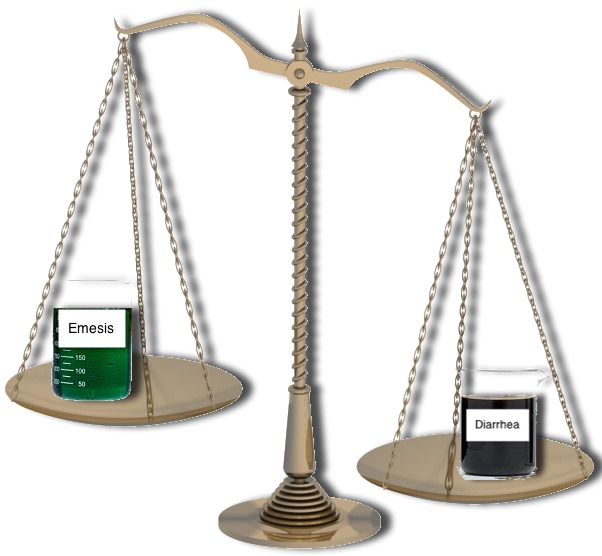Diarrhea and Dehydration
We have all been there: listening to the family describe, with great concern, the apparent tremendous volume of emesis that their child produced prompting the ED visit. Everyone is knowledgeable about “dehydration” and is aware of the potential dangers it entails. Additionally, watching your child spew forth foul liquid in a manner only Linda Blair’s character, Reagan, in the Exorcist could rival is quite traumatic for parents. Fortunately, we have Ondansetron and are often able to make the flow of vomit diminish; however, in all honesty, it is the amount of diarrhea that will more likely lead to dehydration. What can be done for diarrhea and dehydration?
We have already reinforced the efficacy of Oral Rehydration Solutions in the treating dehydration. What, however, can you tell the family to help prevent dehydration in the first place?
It’s about volume!
- While, it is difficult to truly measure the amount of emesis or diarrhea, most recommend the following:
- For every episode of emesis, replete 2ml/kg.
- For every episode of diarrhea, replete 10ml/kg.
- Use an acceptable Oral Rehydration Solution to help maintain hydration.
- Fluids with too much sugar (ex, fruit juice) can lead to greater osmotic load in the intestinal lumen, producing more diarrhea.
Give the family something tangible!
- Honestly, it is a little annoying to bring your kid to the doctor’s only to get a pat on the head and hear that “it’s a virus.”
- You, certainly, may be correct in that diagnosis, but you will not be perceived in a good light.
- Instead, give the family something tangible: some knowledge on how to appropriately replete volume losses.
- Telling the family to give 10ml/kg for every episode of diarrhea won’t easily produce the results you were looking for.
- Instead, give them tangible goals based on that information.
- For instance, let’s consider a 6 month old who weighs ~8kg
- After each episode of diarrhea, we would recommend 80mL of formula / breastmilk / oral rehydration solution.
- 30mL = 1 oz
- So, if the child consumes about 2.5 oz for every episode of diarrhea, the family can help prevent dehydration.
- Families understand this concept much better, as their lives often focus on fluid ounces, particularly early on in the child’s life.
- It can be useful to write out this goal on a prescription or other discharge instructions.
Readjust expectations
- Typically, parents are highly focused on routines and what the typical quantities that are consumed by their child.
- Gentle readjustment of these expectations is important: “When I don’t feel well, I don’t eat a huge meal either.”
- The focus should not be on getting the kid to consume what he/she normally does, but rather preventing dehydration.
- If we utilize the information above, and encourage consumption of smaller amounts more frequently, the family can be successful at preventing a return visit to the ED.
Spend extra time now to prevent another visit
- Most families do not enjoy coming to the ED, but do so out of concern for their child. I think we can all respect that.
- It is easy to become crass because we are inundated with multiple patients who have a benign etiology of their vomiting and diarrhea.
- Take a few extra minutes to sit down and explain simple interventions that may prevent a return ED visit (which your colleagues will appreciate).
- Readjust expectations.
- Discuss dehydration and how to prevent it.
- Give tangible information (and write it down).
- Discuss potential for Probiotics in diminishing diarrhea.



[…] be the butt of many jokes – see what I did there?). It causes a large burden to patients (ex, dehydration), care providers, and the healthcare system. Fortunately, more often than not, it is a self-limited […]
[…] reflexively and have little true clinical utility. The healthy kid (or adult for that matter) with vomiting and diarrhea for two days does not typically benefit from the “Chem 200” {recall, dehydration is a […]
[…] shock warrants great concern. Whether it is caused by Sepsis, Hypovolemia, Obstructive process (ex, Tamponade, PE, Pneumothorax), Cardiogenic conditions, or […]
[…] illness can be quite debilitating and even devastating in children. Often the main concern is Dehydration and that focusing on Oral Rehydration Therapy many of these children will do just fine. While […]
[…] Diarrhea and Dehydration – Some great pearls here especially on how to communicate this issue to the family. […]